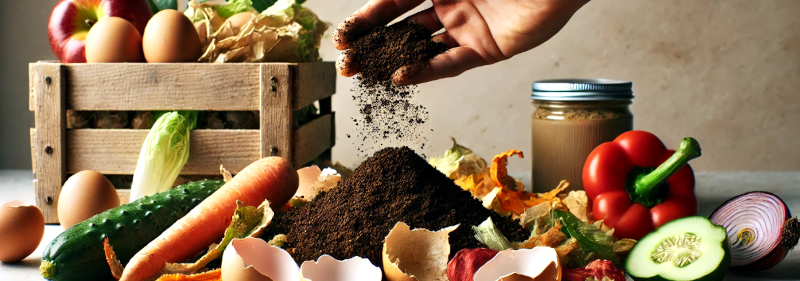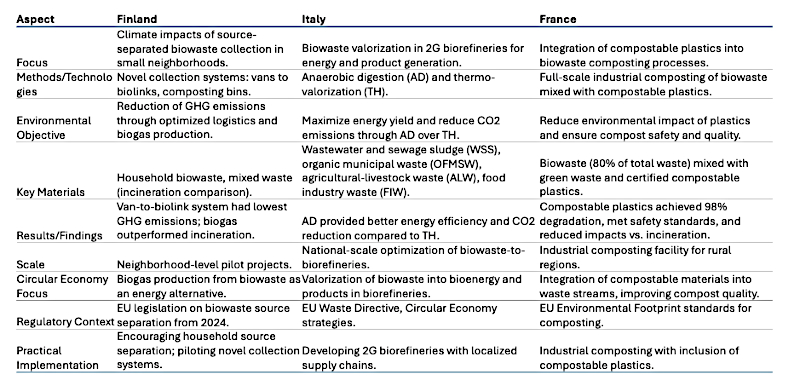
The EU Policy Framework for Biowaste Management
Biowaste management is a key element of the European Union’s sustainability agenda, aimed at reducing greenhouse gas (GHG) emissions, improving resource efficiency, and transitioning to a circular economy. The EU Green Paper on Biowaste Management [1] outlines three central goals for member states: separate collection, landfill diversion, and biological treatment. These objectives address the dual challenges of managing waste sustainably and protecting the environment.
Separate collection is essential for the high-quality processing of biowaste into compost and biogas, enabling its use in agriculture and renewable energy generation [2]. However, effective implementation requires substantial public engagement and infrastructure investment. Landfill diversion focuses on mitigating methane emissions from decomposing organic waste, which contribute significantly to climate change. The EU Waste Framework Directive mandates the progressive reduction of biodegradable waste in landfills, promoting alternative treatment methods. Biological treatment, including anaerobic digestion (AD) and composting, facilitates nutrient recycling and renewable energy production, supporting the EU’s circular economy objectives.
Finland’s Circular Economy Approach to Biowaste
Finland has adopted innovative approaches to align with EU waste legislation, emphasizing GHG reduction and circular economy principles [3]. Anaerobic digestion is the preferred treatment method for source-separated biowaste, generating biogas with a lower carbon footprint compared to incineration. Pilot programs, such as biolink systems and decentralized composting bins, aim to optimize logistics and reduce emissions. Despite these advances, challenges persist, particularly in rural areas where sparse populations increase transportation distances. Public participation remains another barrier, requiring user-friendly systems to encourage compliance. Finland’s commitment to EU policies and renewable energy solutions highlights its leadership in sustainable biowaste management.
France’s Urban Composting Solutions and Challenges
France primarily manages biowaste through industrial composting, supported by door-to-door collection systems [4]. Compost produced complies with stringent safety standards and is certified for organic farming. Efforts to integrate compostable plastics into the waste stream aim to improve sorting and reduce contamination. However, challenges remain, including limited urban space, high collection costs, and gaps in public engagement. France is addressing these issues through public education campaigns, community composting initiatives, and enhanced regulations supporting compostable materials. These efforts underscore France’s commitment to meeting EU targets and advancing sustainable urban biowaste practices.
Italy’s Regional Disparities and Anaerobic Digestion Strategies
Italy leverages anaerobic digestion as a primary method for processing municipal and agricultural biowaste, emphasizing energy recovery and GHG reductions [5]. Integrated facilities combining anaerobic and aerobic processes enhance efficiency, while composting supports nutrient recycling. However, regional disparities in biowaste distribution and infrastructure pose challenges, alongside high transport costs and seasonal variations. Italy addresses these issues through geo-localization to optimize logistics, legislative incentives supporting waste-to-energy plants, and investments in biorefineries for high-value product development. These strategies align with EU directives and promote sustainability in biowaste management.
A Comparative Overview of Biowaste Management Practices
The biowaste management strategies of Finland, France, and Italy showcase distinct but complementary approaches (Table 1). Finland focuses on efficient logistics and biogas production, while France emphasizes urban composting and public engagement. Italy prioritizes anaerobic digestion and regional adaptation to optimize resource recovery. Despite varying challenges, all three countries align with EU goals to reduce GHG emissions and promote circular economy practices, offering valuable insights into sustainable biowaste management across diverse contexts.
Table 1.

Conclusion: Toward Sustainable Biowaste Management in Europe
Biowaste management in Europe is at a pivotal juncture, with growing emphasis on sustainable practices and compliance with EU directives such as the Waste Framework Directive and the Circular Economy Action Plan. Comparative insights from Finland, France, and Italy reveal diverse approaches, each contributing valuable strategies for biowaste processing, collection, and utilization. While Finland focuses on logistical innovations and biogas production, France emphasizes urban composting and the integration of compostable materials, and Italy leads in anaerobic digestion and biowaste valorization through biorefineries.
Future implementations must build on these foundations to address existing challenges and improve system-level efficiencies [6]. Enhancing source-separation systems remains a priority across all regions, with greater emphasis on public engagement and education to increase participation rates. User-friendly systems, such as localized biowaste collection hubs and incentivized separation programs, can significantly improve compliance and resource recovery.
Optimized logistics are another critical area for advancement. Finland’s pilot programs, including biolink systems and decentralized composting bins, demonstrate how transportation-related emissions can be minimized. These innovative models should be scaled and adapted to other regions, particularly those with rural or geographically dispersed populations.
Advancements in anaerobic digestion technology also hold significant potential for future applications. Italy’s integrated facilities that combine anaerobic and aerobic processes highlight how operational efficiencies can be maximized. Expanding biogas production from biowaste not only reduces GHG emissions but also supports the transition to renewable energy, aligning with EU climate goals.
Policy integration will be key to driving these advancements. Strengthened alignment with EU directives, coupled with national and regional incentives, can support the development of waste-to-energy facilities, the adoption of compostable plastics, and the creation of markets for biowaste-derived products such as organic fertilizers and bioplastics. Geo-localization and strategic placement of biowaste processing facilities, as seen in Italy, offer valuable insights into improving logistical efficiency and cost-effectiveness.
Finally, continued research and pilot studies are essential to refine biowaste management practices. Monitoring the environmental impacts of new collection and processing methods, such as those piloted in Finland and France, can help identify best practices and mitigate potential rebound effects. The integration of circular economy principles, particularly the conversion of biowaste into high-value products, will further enhance sustainability and resource efficiency.
References
- European Commission. (2008). Green paper on the management of bio-waste in the European Union (COM(2008) 811 final). Brussels, Belgium: Author. Retrieved from https://op.europa.eu/en/publication-detail/-/publication/b2341160-6612-4d97-a147-93308c9c8f5e/language-en
- Directive 2018/851 of the European Parliament and of the Council of 30 May 2018. (2018). Amending Directive 2008/98/EC on waste. Retrieved from https://www.eea.europa.eu/policy-documents/directive-eu-2018-851-of
- Uusitalo, V., Abrari, L., Hupponen, M., Havukainen, J., & Levänen, J. (2023). Climate impacts of source-separated biowaste from small neighbourhoods in Finland based on pilot experiments for novel biowaste collection systems. Waste Management (Elmsford), 171, 433–442. https://doi.org/10.1016/j.wasman.2023.09.026
- Gastaldi, E., Buendia, F., Greuet, P., Benbrahim Bouchou, Z., Benihya, A., Cesar, G., & Domenek, S. (2024). Degradation and environmental assessment of compostable packaging mixed with biowaste in full-scale industrial composting conditions. Bioresource Technology, 400, 130670–130670. https://doi.org/10.1016/j.biortech.2024.130670
- Demichelis, F., Piovano, F., & Fiore, S. (2019). Biowaste management in Italy: Challenges and perspectives. Sustainability, 11(15), 4213. https://doi.org/10.3390/su11154213
- European Environment Agency. (2020). Bio-waste in Europe: Turning challenges into opportunities. Retrieved from https://www.eea.europa.eu/publications/bio-waste-in-europe